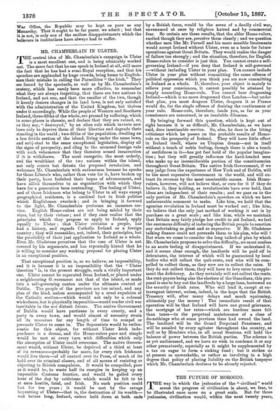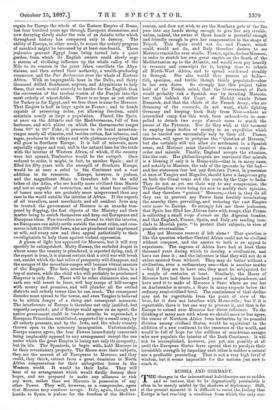THE FUTURE OF MOROCCO.
MBE way in which the jealousies of the " civilised" world _ arrest the progress of civilisation is about, we fear, to be illustrated once more on a great scale. But for those jealousies, civilisation would, within the next twenty years, regain for Europe the whole of the Eastern Empire of Rome, lost four hundred years ago through European dissensions, and now decaying slowly under the rule of an Asiatic tribe which throughout history has conquered only to destroy. The ability of Europe, in other words, to secure the orderly progress of mankind might be increased by at least one-fourth. Those jealousies prevent Egypt from being turned into a quiet garden, from which its English owners could slowly urge a stream of civilising influence up the whole valley of the Nile to its sources in the great lakes, conciliate the Abys- sinians, and then extend their authority, a wealth-producing commerce, and the Pax Britannica over the whole of Eastern Africa. With an impregnable base in the Delta, and thirty thousand drilled Sondanese, negroes, and Abyssinians to help them, that work would scarcely be harder for the English than the conversion of the treeless wastes of the Punjab into the most orderly of wheat-fields. There is no hope as yet either for Turkey or for Egypt, and we fear there is none for Morocco. That Empire is half as large again as France ; and in hands capable of preserving order, yet allowing freedom, could maintain nearly as large a population. Placed, like Spain, at once on the Atlantic and the Mediterranean, full of fine harbours, and with plains on which the thermometer ranges from 40° to 90° Fahr., it possesses in its broad mountain- ranges nearly all climates, and besides cotton, fine tobacco, and sugar, produces in its valleys and wide plateaus everything that will grow in Southern Europe. It is full of minerals, more especially copper and coal, and is the natural base for the trade with the interior of Western Africa, of which, if the country were but opened, Timbuctoo would be the entrepdt. Once reduced to order, it might, in fact, be another Spain ; and if filled for fifty years with the overspill of Southern Europe, would be at once a relief to the Continent and a vast addition to its resources. Europe, however, is jealous, and the magnificent State is therefore left to the wild tribes of the Atlas, who are hardly more civilised than Maoris and not so capable of instruction, and to about four millions of tamer men who are probably more misgoverned than any race in the world outside the interior of Africa. If the reports of all travellers, most merchants, and all resident Jews may be trusted, the government of Morocco is an anarchy tem- pered by flogging, the first objects of the Ministry and their master being to enrich themselves and keep out Europeans and European ideas. Few travellers are allowed to visit the interior, no Europeans can safely settle outside the coast cities, and com- merce is left to 300,000 Jews, who are plundered and imprisoned at will, and every now and then appeal pathetically to their co-religionists to help them against violent oppression.
A gleam of light has appeared for Morocco, but it will very speedily be extinguished. Muley Hassan, the secluded despot in whose name the country is plundered, is reported dying, and, if the report is true, it is almost certain that a civil war will break out, amidst which the last relics of prosperity will disappear, and the savages of the mountain-ranges will become virtual masters of the Empire. The heir, according to European ideas, is a boy of sixteen, while the child who will probably be proclaimed Emperor is only five. There will be other claimants also, and each one will resort to force, will buy troops of hill-savages with money and promises, and will plunder all the settled districts and orderly towns that he can reach. The consequent disorder must spread to the towns, and even Tangier is believed to be within danger of a rising and consequent massacre. The interference of Europe is therefore not only justified, but urgently required; and if Europe could agree on an agent, the native government could in twelve months be superseded, a European Princedom established, supported by a small army, by all orderly peasants, and by the Jews, and the whole country thrown open to the necessary immigration. Unfortunately, Europe cannot agree, the four Powers immediately concerned being implacably opposed to any arrangement except the one under which the great Empire is losing not only its prosperity, but its life. The Spaniards, to begin with, hold Morocco to be their reversionary property. The Moors were their subjects, they are the nearest of all Europeans to Morocco, and they could, they think, extract from a great dominion in North Africa compensation for their unforgotten losses in the Western world. It would be their India. They will hear of no arrangement which would finally destroy their hopes, and are prepared to make any alliances or risk any wars, rather than see Morocco in possession of any other Power. They will, however, as a compromise, agree that Morocco may continue savage. Italy, again, though not hostile to Spain, is jealous for the freedom of the Mediter-
ranean, and does not wish to see the Southern gate of the Sea pass into any hands strong enough to give her any trouble, unless, indeed, the owner of those hands is powerful enough and friendly enough to give her compensation in the shape of Tripoli. This Spain could not do, and France, which could, would not do, and Italy therefore desires to see Morocco remain for ever sterile. France, again, desires Morocco, in order to stretch her own great empire on the South of the Mediterranean up to the Atlantic, and would even pay heavily in treasure and conscripts for it, hoping thus to inherit all North-West Africa, and to spread southward steadily to Senegal. She also would thus possess an India— rich, spacious, and fertile, though thinly populated—close to her own doors. So strongly has this project taken hold of the French mind, that the Government of Patio would probably risk a Spanish war by invading Morocco, but that behind the Court of Madrid stands Prince Bismarck, and that the chiefs of the French Army, who are dreaming of the revanche, do not want, while fighting Germany and keeping back Italy from Nice—where an intrenched camp has this week been ordered—to be com- pelled to detach two corps d'arrnee more to watch the passes of the Pyrenees. Nor do they wish at this moment to employ large bodies of cavalry in an expedition which can be carried out successfully only by their aid. France, therefore, will agree to postpone the "Question of Morocco," but she certainly will not allow its settlement in a Spanish sense, and Morocco must therefore remain a scene of die. order and misrule. Finally, England accepts the situation, like the rest. Her philanthropists are convinced that misrule is a blessing if only it is Home-rule—that is, in many cases, and notably in Morocco, the rule of the ignorant by the bad— and her statesmen fear lest any first-rate Power, in possession at once of Tangier and Mogador, should have a dangerous grip on both the Canal route and the route by the Cape to India. They do not as yet see their way to any compromise, the Trans-Canadian route being too new to modify their opinions, and they therefore " protect " Morocco,—that is, they do all they can to prevent any Power from forcibly terminating the anarchy there prevailing, and restoring the vast Empire once more to Europe. So strongly felt are these jealousies, that Spain has filled her African forts with troops, that France is collecting a small carps crartnee on the Algerian frontier, and that England, France, Spain, and Italy are sending iron- clads to Moorish ports, "to protect their subjects, in view of possible eventualities."
May not Morocco recover if left alone ? That question is like the question whether Central Africa could not be civilised without conquest, and the answer to both is an appeal to experience. The negroes of Africa have had at least three thousand years during which to develop a civilisation, and have not done it ; and the inference is that they will not do it unless assisted from without. They may do better without a civilisation, even a rudimentary one—that is another matter —but if they are to have one, they must be subjugated for a couple of centuries at least. Similarly, the Moors of Morocco have had three hundred years of independence, and have used it to make of Morocco a State where no one but an Ambassador is secure, a State in many respects below the ordinary semi-civilised level. The continuance of that decline may not be regrettable from the point of view of the hour, for it does not interfere with Home-rule ; but if it is regrettable, there is but one way to prevent it, and that is for Europe to extend over Morocco her direct influence. To the thinking of many men with whom we should more or lees agree, the rescue of Northern Africa from barbarism by its peaceful division among civilised States, would be equivalent to the addition of a new continent to the resources of the world, and would be full of hope for the millions of murderous savages who now populate the interior of the Dark Continent. It will not be accomplished, however, just yet, nor possibly at all until the European States have agreed that to paralyse their irresistible strength by impeding each other is neither a natural nor a profitable proceeding. That is not a very high level of wisdom, but it seems impossible for the nations just now to reach it.



































 Previous page
Previous page